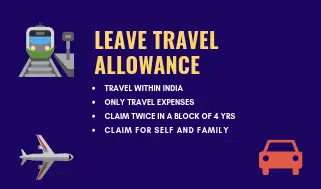You may not be content with your take home salary, but you can always find ways to increase it. In this post, I share ten tips on how to increase your take home salary- India . You can increase your take home salary by more than Rs. 2.50 lakhs per year. A lot of these tips is about avenues to save tax on your salary through a variety of options.
I see many people either not taking these benefits or not utilizing it to the maximum.
You may be knowing some of these tips. But even if you know this, it is time to put things into action.
Many a times people just want to avoid the effort required. So you can have a look at the potential savings here for some motivation.
There are limited avenues to save tax on salary, so make sure you make use of those available to you.
#1. Optimise Salary Structure for Tax Savings (Restructure salary)
Check with your HR / payroll on what are the tax saving options available in your salary structure. Some of the popular tax saving options are:
- Food Vouchers i.e. Sodexo Coupons etc. are tax free up to Rs.100 per working day i.e. Monthly Rs.2,600/- assuming 26 working days.
- Telephone expenses reimbursement is fully tax free for official use. You are generally required to have a post-paid connection and provide mobile bill to claim this.
- Car Lease / Petrol reimbursement (usually available at management grade)
- Gift card (Maximum Rs.5,000/- annually is tax free)
You need to ask what options are available with the Company for tax saving. Many companies offer Flexible Compensation Structure where you can pick certain CTC components as per your choice to save tax.
#2. Use option on Employee Provident Fund (EPF)
Check if you have an option for not taking Employee Provident Fund. Yes, some companies do provide you an option on this. As per law, Provident Fund is mandatory only for employees whose basic salary is less than Rs.15, 000/-.
Make sure you use this option with caution, as Provident Fund helps you to save some part of your income for the future.
Also, Employer’s contribution to EPF is tax-free subject to certain conditions.
But if you feel you can make better investments by getting a higher take home salary, you can go for this option if your employer allows this.
#3. Take full benefit of HRA exemption
Make sure you are claiming HRA exemption. This is a no brainer.
HRA is usually as much as 50% of basic salary and can offer a significant tax benefit.
You can save a good amount of tax by claiming HRA exemption. This exemption can be taken even if you pay rent to parents, but make sure you follow the proper procedures in this regard. (Read this post on the precautions you need to take)
#4. Take a Leave- Claim your Leave Travel Allowance
Make sure you are taking full advantage of Leave Travel Allowance deduction.
It’s not only important to take a leave for you and your family’s recreation but also for tax benefit.
Your LTA will be exempted from tax only if you take a leave and make a claim.
There are four key conditions:
- Travel should be only within India. International travel is not allowed
- You can claim the amount twice in a block of four years. Current block is 2018-2021.
- You should actually take a leave and travel (which is quite obvious). Travel for self and family is allowed, where family includes your spouse, children and dependent parents, brothers and sisters .
- Deductions is available only on the travel expenses .i.e. air, rail or bus fare incurred and not for your accommodation, food cost etc.
#5. Fully utilise 80C deduction of Rs.1.50 lakhs
Make sure you are claiming the full benefit of 80C deduction (Maximum- Rs.1.50 lakhs).
Before investing in 80C, first check the amount you have paid for:
- Your contribution to EPF
- Life Insurance premium (for any Life Insurance you have taken)
- Children’s tuition fees (if any)
- Home Loan Principal repayment (if any)
The balance amount (out of Rs.1.50 lacs) after considering the above expenses, you can invest in products like ELSS, NSC etc.
A tip here is to invest early or throughout the year so that you can get the return on the investment for the full year as well. In case you are investing in ELSS, you can also take advantage of times where the market has fallen considerably to buy more ELSS or opt for a SIP.
#6. Get a medical insurance cover for yourself and parents (80D benefit)
Make sure you are taking full benefit of 80D deduction (Medical insurance premium). Getting medical insurance is not only an important necessity, but can help you save a good amount of tax.
Deduction up to Rs.25,000/– is available for medical insurance premium that you pay for yourself, spouse and children.
Additional deduction up to Rs.25, 000/– is available for premium paid for insuring your parents. This available benefit increases to Rs.50,000/- if anyone of the insured parents is a senior citizen.
So in all, you can get a maximum deduction of up to Rs.75,000/– for premium paid for your family and senior citizen parent(if non-senior citizen parent, the benefit adds up to Rs. 50,000/-).
In case your parents are super senior citizens (80 years & above), where you don’t have a medical insurance, you can claim expenditure on medical treatments under this section upto Rs. 50,000/-
#7. Go for a preventive health checkup
Many people miss to claim this deduction.
Within the limit of 80D i.e. Rs.25,000, you can claim a deduction of up to Rs.5,000/- per annum for preventive health checkup for yourself, spouse, children and parents.
e.g. if your medical insurance premium you paid for your family is Rs.20,000/- , you can use the balance Rs.5000/- on any expenditure you have incurred on preventive healthcheckup.
#8. Save Tax on your Home Loan
If you are paying interest on home loan or planning to buy a house, this can be another good tax saver.
The interest paid on home loan is allowed as deduction from your income up to Rs. 2 lakh per year (for your own house).
You can can save a decent amount of tax if you are claiming this benefit.
Can you take benefit of both HRA exemption and house loan interest?
The answer is yes, if you stay in a rental property and not in your own house property.
This can happen in many situations i.e. if you stay on rent in Mumbai for a job and your own a house is in another city i.e. Bangalore.
If you have put your own house on rent, you can get the full interest on home loan as a loss (without the cap of Rs.2 lakh). But of course, you will have to pay tax on your rental income.
There may be a situation where you have a purchased a house which is under construction and you stay in rental accommodation during this period. In this case also, you can get the benefit of both.
What’s important is that there is a genuine situation where you have to stay in a rental property.
#9. Save Tax on Education Loan for Higher Study (80E)

If you are interested in higher education, you can get a tax benefit under section 80E of Income Tax for your education loan.
Interest paid on education loan taken for higher education of yourself, spouse and children is allowed as a deduction without any limit.
The higher education means any study after passing the Senior Secondary Examination or its equivalent exam.
The higher study can be in India or abroad.
#10. Opt for Children Education Allowance and Children Hostel Allowance
If you have children, then you can take benefit of Children Education Allowance (Annually: Rs.1200/- per child) if you have children.
You can get this deduction for maximum two children (Government check on population!). Yes, the amount is not much.
The Government has not kept pace with the rising cost of education in India. But something is better than nothing.
If you have children going to hostel, you can take benefit of Children Hostel Allowance (Annually: Rs.3600/- per child) Maximum- Two Children
What’s the benefit? What is the increase in take home salary?
Let’s see how much you can save with these tips. I am assuming tax rate of 30% to calculate the savings which is the maximum slab.
Your savings will depend on the effective rate of tax on your salary.
|
Sr. No |
Expense Type |
Monthly |
Annual |
Annual |
|
1.a |
Food Vouchers |
2,600 |
31,200 |
9,360 |
|
1.b |
Telephone Expenses |
1,000 |
12,000 |
3,600 |
|
1.c |
Petrol Reimbursement (Assumed amount) |
5,000 |
60,000 |
18,000 |
|
1.d |
Gift Card |
5,000 |
1,500 |
|
|
3 |
House Rent Allowance |
20,000 |
2,40,000 |
72,000 |
|
4 |
Leave Travel Allowance |
3,333 |
40,000 |
12,000 |
|
5 |
80C Deduction-Investments |
1,50,000 |
45,000 |
|
|
6 |
80D Deduction- Mediclaim Premium of self + parents (non-senior citizen) |
45,000 |
16,500 |
|
|
7 |
80D Deduction- Preventive health check up |
5,000 |
1,500 |
|
|
8 |
Interest on Home Loan (Assumed figure) |
2,00,000 |
60,000 |
|
|
9 |
Education Loan Interest@11% for loan of Rs. 5,00,000 (Assumed figure) |
55,000 |
16,500 |
|
|
10.a |
Children Education Allowance |
100 |
1,200 |
360 |
|
10.b |
Children Hostel Allowance |
300 |
3,600 |
1,080 |
|
Total Savings per year |
2,57,400 |
|||
In most cases, tax saving is incidental benefit and not a primary factor for your decision making. However, it helps to know the tax saving opportunity while making a decision.
Let me know what is your best tax saving hack.
You can also check this post to calculate your take home salary from CTC.
References:
Hi, I am CA with a passion for personal finance and investing. I use this blog to share helpful money gyan that I have learned the hard way.

